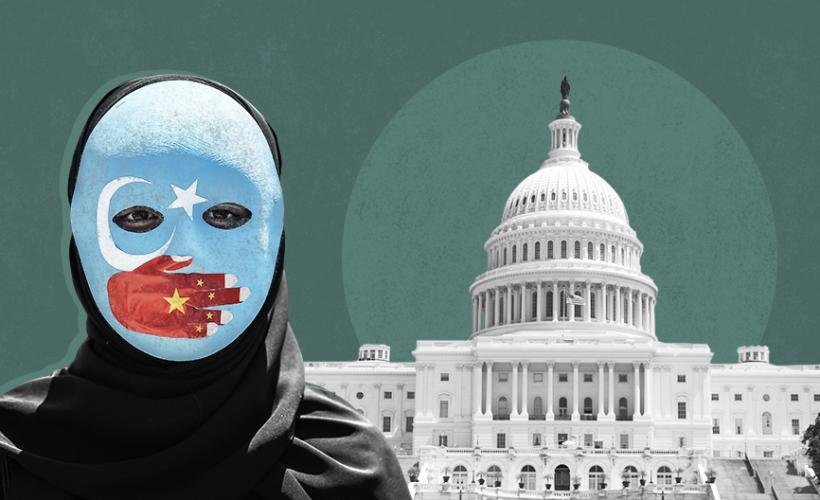U.S. government sanctions China for abuse of Muslim minorities
The U.S. has become the first country to sanction any Chinese company or official for abuses in Xinjiang. The moves to sanction companies and officials were welcomed by human rights activists, but some of the implementation and timing may not have been what they were hoping for.

Photo credit: Ozan Kose / AFP / Getty / The China Project illustration. The demonstrator’s mask bears the light blue color of East Turkestan, the independent homeland that many Uyghurs envision.
China’s system of mass internment camps for Uyghurs and other Muslim ethnic minorities in Xinjiang has been documented in a steady stream of compelling reports over the past two years, starting in the fall of 2017 and through recent months.
Activists have long wondered when the U.S. might act to try to stop the human rights abuses. The Trump administration had reportedly held off on any formal action to sanction China for the abuses, reportedly to avoid disrupting trade talks.
But now, the delay is finally over. Last week, two significant measures were taken:
- The U.S. Commerce Department has put 28 Chinese companies and public security bureaus on its Entity List, banning American companies from supplying them. “The companies added to the so-called ‘Entity List’ include facial recognition start-ups Sensetime, Megvii and Yitu, video surveillance specialists Hikvision and Dahua Technology, AI champion iFlyTek, Xiamen Meiya Pico Information Co and Yixin Science and Technology Co,” per the SCMP.
- Visa restrictions for “complicit” Chinese officials were also announced by the State Department, though the scope of these measures has still not been defined.
What effect will these sanctions have?
With these moves last week, the U.S. has become the first country to sanction any Chinese company or official for abuses in Xinjiang. The move was welcomed by human rights activists, but some of the implementation and timing may not have been what they were hoping for:
- The practical effects will be largest for the companies on the Commerce Department’s Entity List. Video surveillance companies in particular, like Hikvision and Dahua, will struggle to find replacements for American-made or -designed components, reporting from the Financial Times has indicated.
- But some of the abusive companies were, until now, flying high. iFlytek, which specializes in automated voice recognition, one of many biometric markers that authorities have forcibly obtained from ethnic minorities in Xinjiang, is expecting its profits to “surge at a pace ranging from 50.61 percent to 73.43 percent year on year,” according to a filing to the Shenzhen Stock Exchange.
- The visa restrictions were not as severe as some activists had hoped, as they did not invoke the Magnitsky Act, which would have additionally frozen assets of individuals.
- Finally, the timing of the sanctions — only two days before U.S.-China trade talks began in Washington, D.C. — was seen as less than ideal. Samm Sacks, an expert in Chinese technology policy, said that the timing has the effect to “undermine any US credibility on human rights issues going forward because it’s clear we only take action when it serves other interests.”





